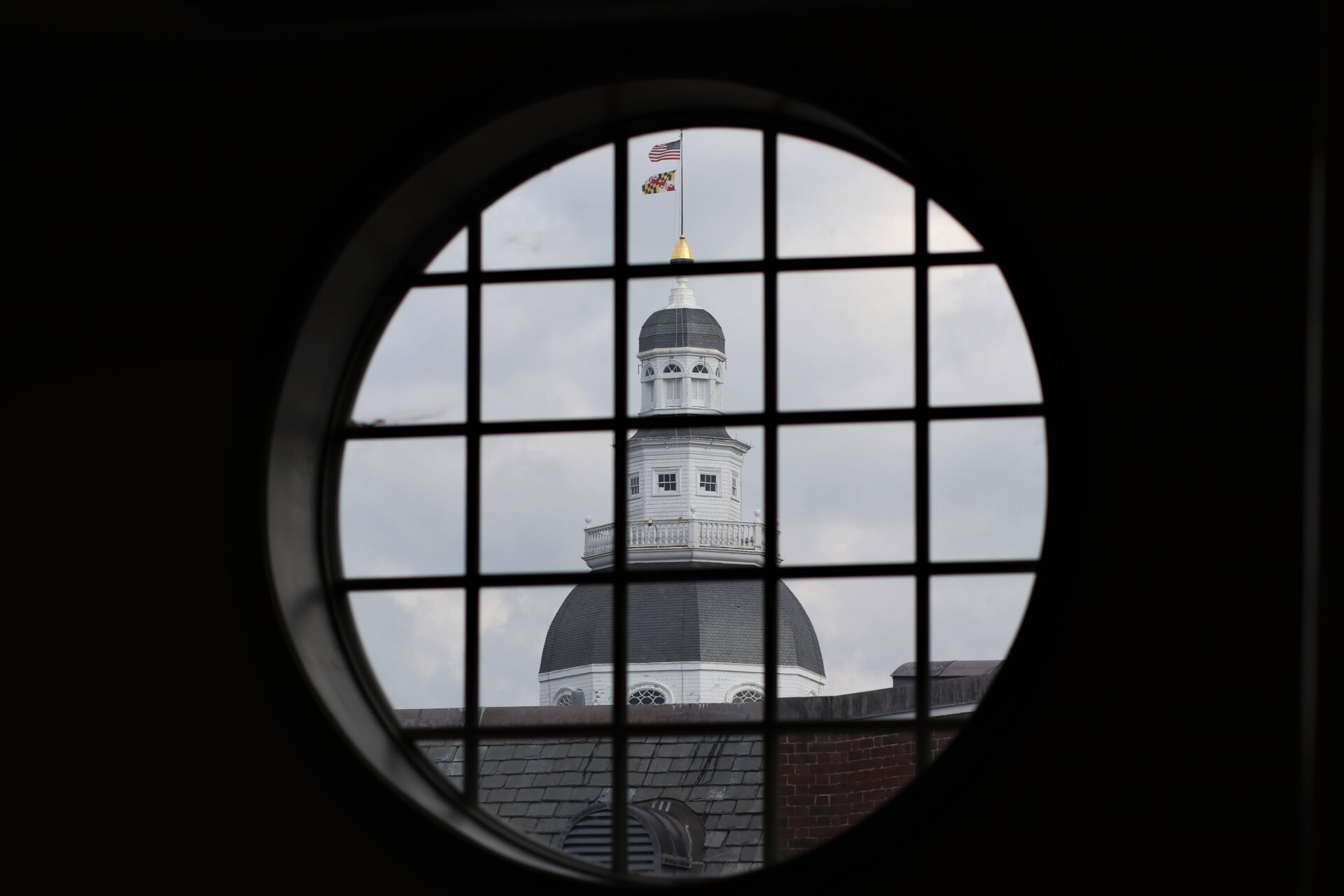Glitches in State Government Response to Virus Taking Center Stage

Even as Maryland inches closer to reopening its economy and is easing restrictions on recreational activities, the state government is coming under increasing — and occasionally partisan — criticism for some of its responses to COVID-19.
From a politically-connected firm that is now under investigation for a contract with Maryland to provide medical equipment, to a breakdown in the state’s new website for Marylanders to file unemployment claims, to the wrong date on ballots sent to voters ahead of the June 2 primary, government miscues are increasingly attracting headlines. And they are leading to calls for more scrutiny over how state government contracts are being awarded — at a time when billions of dollars are coming in from the federal government and going out to health care providers, businesses, individuals and other entities that are relying, more than ever, on government aid.
“There are billions of dollars involved and everyone should understand what the process is,” state Treasurer Nancy K. Kopp (D) said Wednesday during a virtual Board of Public Works meeting.
While the investigation into the medical supply company, the balky state unemployment website and the erroneous information on the election ballots all represent, at their most basic level, a failure of government, they are also freighted with political crosscurrents.
Gov. Lawrence J. Hogan Jr. (R) answered questions about the investigation and the unemployment website during a State House news conference Wednesday — where he mainly discussed his plans to reopen state parks and beaches.
Hogan did not attempt to minimize or sidestep the problems, but he did assert that his administration has moved aggressively to address them. The governor characterized some of the missteps as a consequence of the government’s crisis-driven response to a fast-moving and dizzying array of unprecedented challenges.
Asked, for example, how much the state has spent on purchasing personal protective equipment since COVID-19 first became the primary focus of government, Hogan replied, “We don’t even have a total yet. It’s hundreds of millions of dollars.”
Of those hundreds of millions of dollars, $12.5 million in state funding was earmarked for Blue Flame Medical LLC, a company founded by national Republican operatives in March. But the state hastily canceled the contract over the weekend, accusing Blue Flame of failing to deliver the promised masks and ventilators.
Raquel Coombs, a spokeswoman for state Attorney General Brian E. Frosh (D) confirmed Wednesday that the state Department of General Services referred the case to the AG’s office for investigation, but she said she could not provide further details. The Washington Post reported Wednesday that the U.S. Department of Justice has now launched an investigation into the Maryland contract — and into a considerably larger contract the company reached with California state authorities to provide protective gear.
Blue Flame, according to published reports, obtained its Maryland contract after the company founders contacted someone in the Hogan administration that they knew. The firm has now hired former state attorney general Douglas F. Gansler (D) for legal representation.
In an email to Maryland Matters late Wednesday afternoon, Gansler declined to answer questions and referred to a statement that another company attorney, Ethan Bearman, had provided to other media outlets. That statement said in part that Blue Flame “is devoted to getting masks and ventilators” to Maryland.
But this particular incident raises uncomfortable questions about whether Maryland governments may be getting fleeced on other contracts.
“We were lucky to catch this one situation,” Hogan said at his news conference. “Hopefully, there aren’t others.”
Woes with unemployment website
Meanwhile, there continue to be political reverberations over problems with the website the Maryland Labor Department set up to process new unemployment claims. The website crashed within hours after it went live on April 24, causing a backlog of tens of thousands of filings in the immediate aftermath of the technical difficulties.
Hogan has been publicly apologetic over the website woes, but also insistent that the problems were addressed quickly.
“The unemployment site has been fixed for 10 days,” he said at the State House. “There has been no wait, I think, since last Monday.”
Hogan said every state has struggled to process unemployment claims, which have skyrocketed since mid-March, and that managing the caseload has been a challenge as federal regulations over jobless benefits have changed seven times in recent weeks.
“It’s frustrating still for people who haven’t received their checks,” he conceded.
U.S. Rep. Anthony G. Brown (D-Md.) published an op-ed in The Baltimore Sun Wednesday that blasted Hogan for the website breakdown.
“Maryland is not alone in feeling the economic impact of this public health emergency,” Brown wrote. “Yet, other states have been able to successfully handle the increased demand on their unemployment systems.”
The political message was hard to miss: Hogan defeated Brown in the 2014 gubernatorial election, and Hogan during that campaign made hay out of the initial failure of the state’s health care marketplace website, which Brown oversaw as lieutenant governor under former Gov. Martin J. O’Malley (D).
Hogan did not directly address Brown’s criticisms during his news conference Wednesday, but did say, “I think we’re performing better than just about anywhere in America.”
Earlier Wednesday, state lawmakers told Maryland Labor Secretary Tiffany P. Robinson that they are being inundated with complaints from constituents who have yet to receive unemployment benefits.
During a video conference with the legislature’s COVID-19 workgroup, Robinson said the department and its vendor have been working seven days a week to improve the system — known as BEACON One-Stop — and that wait times are down substantially.
“We have resolved many of those issues and performance has significantly improved,” Robinson said. “We know there are still frustrations. … We’re doing the very best we can, working around the clock.”
Robinson said the Department of Labor has:
- created a “virtual waiting line” to control the record traffic on the site and reduce delays to those who able to log on;
- obtained approval from the federal Department of Labor to tweak language that was causing “some confusion”;
- contracted with a vendor to hire 200 “unemployment insurance professionals” to help Department of Labor personnel process claims
“We have not had to relay on [our] queue, that virtual waiting line, almost at all,” she said. “There have been zero to only a few minutes of waiting time for any customer at any given time over the past several days, including on Sunday and Monday, which are our highest-volume days.”
Robinson said some claims are delayed because information provided by unemployed workers conflicts with data provided by their former employer, requiring “an adjudication.”
Senate President Bill Ferguson (D-Baltimore City) urged the agency to be as flexible as possible, “to help people who are in crisis.”
“At the end of the day, the adjudication and the processes don’t put food on the table,” he added. “There are people who have been waiting for weeks to feed their family.”
Robinson said the agency is testing a mobile app to make it easier for people to file from their phone, but she said it will not be rolled out “until I know it is going to work.”
The state has paid over more than $170 million a week in benefits over the past few weeks, compared with an average of $4 million to $7 million before the downturn, she said.
Spreading the word about the June 2 primary
During Wednesday’s Board of Public Works meeting, state Comptroller Peter V.R. Franchot (D) was highly critical of state elections officials after the Baltimore Brew first reported Tuesday night that current primary ballots being mailed to Maryland voters incorrectly list the election date as April 28.
The state primary had originally been scheduled for April 28 but was postponed to June 2 amid the COVID-19 pandemic. The ballots that are being mailed to Maryland household do feature language elsewhere that explain that the primary has been delayed until June 2.
Franchot said he was “incredulous” that, considering Hogan rescheduled the primary on March 17, that the State Board of Elections didn’t have time to publish new primary ballots — especially now that the state is hoping to conduct the election primarily by mail.
“All you had to do was change the date,” Franchot said.
But state elections officials defended their decision, noting that ballots had already been mailed out to members of the military serving overseas when Hogan decided to change the election date. Nikki Charlson, the state’s deputy elections administrator, told Maryland Matters that the State Board of Elections has allocated $1.1 million for a voter education effort — funds that will be coming from the federal government.
KO Public Affairs, a Baltimore-based firm led by former top O’Malley aides, has won the contract to do the voter education effort, Charlson said, and that firm has contracted with Campfire Communications, an Annapolis company run by Henry Fawell, the communications director for then-Gov. Robert L. Ehrlich Jr. (R); Mission Media, a Baltimore-based digital media firm; and Sandy Hillman Communications, a well-established Baltimore PR shop; to aid the effort.
As questions continue to mount over state contracting practices, the Board of Public Works has scheduled a full briefing for May 20 to learn more about the procurement process during COVID-19.
“A lot of these things are not normally things that we buy,” Robert Gleason, Maryland’s chief procurement officer, told the board.





 Creative Commons Attribution
Creative Commons Attribution